Bamboo Server – Integration and Release Management
Build, test, deploy
Continuous software delivery, from code to deployment
Combine automated builds, tests, and releases into a single lifecycle
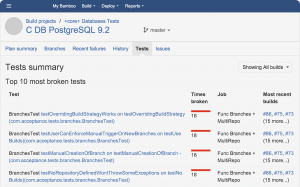 |
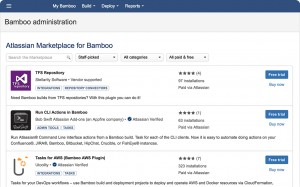 |
|
Assembly Pay attention to your code and rely on Bamboo as a continuous integration and build server. Create multi-stage build plans, set up triggers to trigger commit builds, and provision agents for the most important builds and deployments. Test Testing is a critical step in continuous integration. Run automated tests in Bamboo to thoroughly check every change. Parallel automated tests reveal the power of agile development and help to find bugs easier and faster. |
Deployment Bamboo offers first-class support for continuous software delivery. Deployment projects automate the monotonous process of releasing to each environment, while allowing you to control what happens with different access rights for each environment. Integrate Bamboo has the most effective integration with Jira Software, Bitbucket and Fisheye. Extend the capabilities of your continuous integration pipeline by selecting the right applications from more than 150 options in the Atlassian Marketplace or by creating your own application. |
Important Integrations
Connect Bamboo with Jira Software, Bitbucket, Fisheye, Crucible and hundreds of other tools.
| Continuous delivery | Development Process |
| Deployment projects, as well as integration with AWS CodeDeploy and Docker, provide everything you need to deliver the final product. Use Docker and AWS CodeDeploy as build or deployment jobs. Releases are no longer a problem! | Connect Bamboo with Fisheye and Crucible, with Bitbucket and Jira Software. And then sit back, relax, and just watch the status of builds, deployments, and commits update across all tools.. |
Create quality products! Do it fast!
| Enhanced Continuous Integration/CD | Dev + Ops | Jenkins Import Tool |
| The multi-line software teams update their continuous integration and delivery pipelines using Bamboo. With easy import of builds from popular open source solutions and built-in support for Git, Hg, and SVN, you’ll become champions of builds and deployments. | We are familiar with the principle of DevOps and have taken care of everything! Set up continuous integration builds as usual and upload artifacts to development projects. Combine in-house scripts, smoke tests, and third-party technologies to determine the deployment sequence for each environment. Bamboo supports you all the way from continuous integration to deployment and delivery. | By migrating from Jenkins to Bamboo, teams can import their builds into Bamboo, drastically reducing the transition time. Assembly engineers have more interesting classes than click-by-click monotonously recreating settings. |
| Full SCM support | Git | Lifelong learning |
| In addition to Git, Bamboo is ready to work with SVN, Mercurial, Perforce, CVS, as well as repositories in Bitbucket and Fisheye. It associates assemblies with code changes in the repositories. Commit messages, authors, links, and dates are displayed in the results of each build, allowing you to browse the repository with the latest changes, their history, and all the code in one click. | Bamboo fixes the issues that arise when trying to combine continuous integration (CI) and distributed version control systems such as Git and Mercurial. New branches are automatically brought to the same CI scheme as the main branch, and you can configure any two branches in the repo to merge automatically before running each test. | A variety of training materials, recommendations, and support resources make for help that’s always at hand. In addition, the Bamboo license includes access to our legendary support team. |
Functional
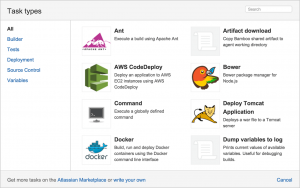 |
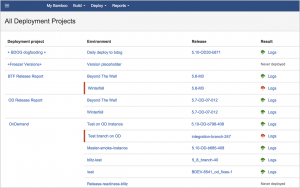 |
|
Technical Stack Bamboo is suitable for any language and any known service, such as AWS CodeDeploy, Docker, and Amazon S3. You can choose from a variety of available jobs to build and deploy, or you can choose from free add-ins. |
Deployment Projects With Bamboo, you can perform top-level deployments using designs and deployment environments. Deployment projects store the entire software project that you are working on: the released and tested that you have collected and tested, and data about the environments in which you deployed them. |
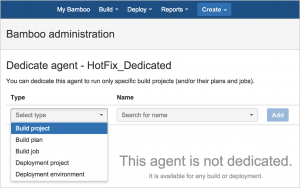 |
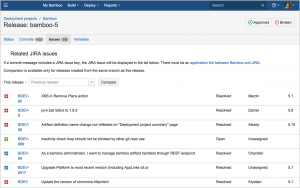 |
|
Dedicated Agents The capabilities of the dedicated Bamboo agent allow you to run patches and important builds immediately. When you allocate an agent, no operation other than the one for which it is allocated can access it. Now, when fixing critical bugs, you no longer have to wait until a free agent appears! |
Visibility Before deploying a new release, review any code changes to Jira Software tasks that have accumulated since the last deployment. This will help operations teams understand what they will be responsible for when deploying to combat and providing support, and release managers will have a clear picture of what’s going on at the moment. |
Build quickly, test software competently, release frequently!
| Parallel tests | Docker Agents | Permissions |
|
Bamboo supports up to 100 remote build agents, allowing you to run test packages in parallel. The queue moves, and developers get feedback quickly. |
In addition to Docker build and deployment planning jobs that allow you to create your own image and upload it to the registry, Docker Hub also has ready-to-use Bamboo agent images: you just have to select and run. |
Main 1TranslationReview categories ExploreWith the different access rights for each environment, developers and QA professionals can perform on-demand deployments in their environments without having access to the primary environment. Assembly engineers and operations teams will spend less time processing deployment requests, and there will be no delays in another phase. |
| Quarantine | Definition of branches | Triggers |
|
“Red” builds should not become the norm. Get cranky or faulty tests out of sight (but don’t forget about them) and keep builds “green” with click quarantine. |
Using separate branches for functionality or for each task does not mean that the quality of the code should suffer. Bamboo finds new branches in the repo of Git, Mercurial and SVN and automatically applies the same continuous integration scheme to them as to the main process. |
Bamboo can initiate builds when code changes in the repository or a push notification is received from Bitbucket, as well as on a specified schedule, when another build is completed, or based on several of the events listed. |